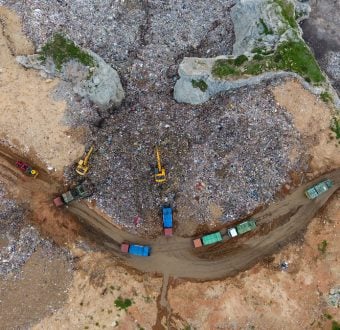 A friend’s engagement. The newest dance trend. An update from your favorite band. Industry-sponsored propaganda meant to deceive you and delay climate action. A cat meme.
A friend’s engagement. The newest dance trend. An update from your favorite band. Industry-sponsored propaganda meant to deceive you and delay climate action. A cat meme.
This is what scrolling through your feed on social media sites might look like today — and that’s because Big Tech has a major climate disinformation problem. Social media companies were unprepared for climate deniers, whatabouters, and the Big Oil PR and marketing machine to use their tactics of deceit on their platforms. On top of that, companies like Facebook and Twitter were happy to benefit from the engagement numbers that the spread of dis- and misinformation brought to the platforms for years. After all, keeping the numbers high attracted investors and advertisers. It was only when the public outcry and federal hearings started to threaten the loss of advertisers, investors, and employees that they began to roll out policies to deal with disinformation.
But, are these policies doing enough?
A new scorecard by Friends of the Earth, Avaaz, and Greenpeace USA shows that Facebook, Pinterest, TikTok, Twitter, and YouTube are still failing to tackle the climate disinformation problem on their sites.
First, it might be helpful to explain what climate disinformation is and how it differs from misinformation. Put simply, “disinformation” is done with the intention to spread false or misleading information to deceive or and to potentially benefit. This differs from “misinformation”, which is wrong or incorrect information that is spread by mistake, oversight, or naiveté. Sometimes, the “climate disinformation” — which has been called out by the scientific community in the IPCC’s latest report as a major threat to meeting our climate goals — is purposefully spreading wrong, deceitful, or misleading information about the climate crisis and its severity or about the technology and solutions we have to combat it.

The fossil fuel industry has been using disinformation as a tool for decades to delay climate action by sowing public distrust in climate science and in the solutions to confront the crisis. In October 2021, the House Oversight Committee held a hearing calling on the CEOs of some of the world’s largest fossil fuel companies to answer for their role in spreading disinformation about the role fossil fuels play in causing global warming. In February of this year, a new study confirmed yet again that the industry commonly uses greenwashing to mislead the public on what they say they are doing vs. what they are actually doing.
We wanted to see what social media platforms were actually doing to prevent the spread of climate disinformation. The report measured companies’ definitions, policies, and processes using a 27-point assessment put together by the Climate Disinformation Coalition. The higher the score, the more advanced the company was in identifying and disclosing how it hopes to prevent the spread of climate disinformation on its platforms. Only Pinterest and YouTube scored over 50%, both scoring 14 out of 27. Facebook, TikTok, and Twitter received 9, 7, and 5 points respectively.

For Facebook, TikTok, and Twitter, the failure starts with a poor foundation from which it builds these policies. These three companies have not adopted a climate expert-informed definition of climate dis/misinformation. In the case of YouTube, its expert-informed definition only applies to paid content – AKA to advertising. Only Pinterest publicly articulates an expert-informed definition that applies to both paid and organic content.
We also found a gross lack of transparency from all five platforms. None of the platforms release regular reports that detail the scale and prevalence of climate dis/misinformation, or on mitigation efforts taken internally. This means there is simply no way to tell if their policies are addressing the problem, if they’re consistently enforced, and if bad actors are able to game the system.
There are some rather simple actions that these companies could take to significantly curb and eventually stop their platforming of disinformation: adopt the most effective policies, follow-through on enforcement, and be transparent about what’s happening.
It’s time for social media companies to stop aiding the planetary collapse that climate disinformation is pushing us towards. Disinformation is so dangerous because it creates an erosion of trust in our communities, and it drives people to extremes. In reality, the only extremists are those pursuing this planet-suicide agenda of more fossil fuels, all for the billions in profits they are trying to make.


